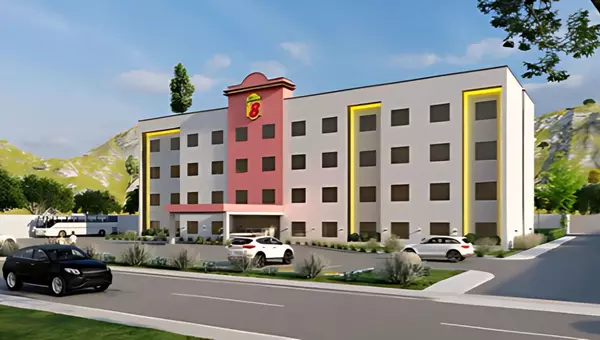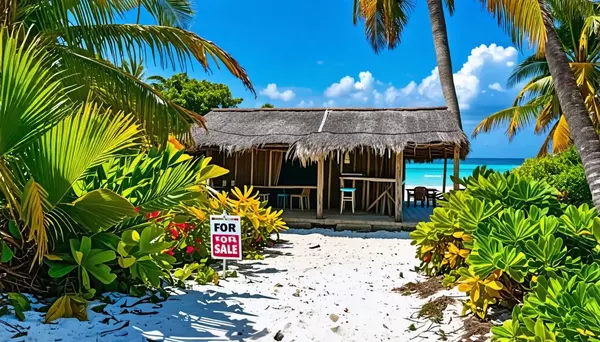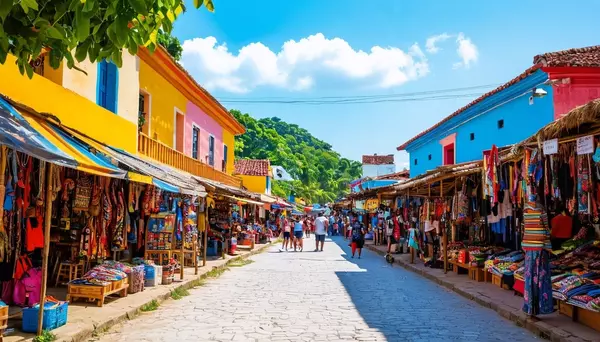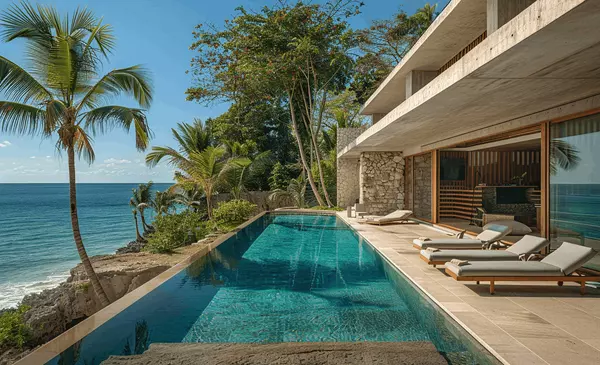Steps to Buying Property in the Dominican Republic

Buying property in the Dominican Republic can be confusing for foreigners. The country's real estate market has grown by 7% annually over the past five years. 3 This guide will walk you through the essential steps to purchase your dream home in the Caribbean paradise. 1 Get ready to learn how to navigate the process with ease. 2
Key Takeaways
Here are the key takeaways in concise, unordered list form:
- The Dominican Republic's real estate market has grown 7% annually over the past 5 years, with rental yields between 6.2-8.9% in tourist hotspots.
- Buyers should budget for a 30% down payment, as Dominican banks typically lend up to 70% of a property's value. Annual property tax is 1% for properties valued over 7,138,000 pesos.
- Working with a reputable local real estate agent is crucial. Select Caribbean Properties and The Agency are two recommended options with strong experience in the Dominican market.
- Due diligence is essential and includes title searches, property surveys, and reviewing all legal documents. A notary public authenticates the Promise of Sale document.
- Foreign buyers can fast-track residency by investing at least $200,000 in a government-approved real estate project. Initial residency application costs around $1,200.
Determine Your Budget

After grasping the basics of property acquisition in the Dominican Republic, setting a realistic budget is crucial. Your financial plan should account for more than just the purchase price.
Factor in additional costs such as transfer taxes, legal fees, and potential property improvements. 1 The Dominican real estate market offers a range of options, from affordable apartments to luxury villas, catering to various budgets.
For those considering financing, Dominican banks typically lend up to 70% of a property's value. This means buyers need to prepare a down payment of at least 30%. Keep in mind that during the high season, which lasts about six months, rental prices can spike by 20% to 50%.
This could affect your budget if you're planning to rent out your property. It's also important to consider the annual property tax of 1% for individual ownership when calculating long-term costs. 2
Research the Market
Once you've set your budget, it's time to dive into market research. The Dominican Republic offers a diverse real estate landscape, from beachfront villas to luxurious condos and countryside homes. 3 Recent data shows promising growth, with GDP per capita increasing by 10.6% in the past five years. This economic upswing has positively impacted the property market, making it an attractive option for investors.
Focusing on tourist hotspots like Punta Cana, Santo Domingo, and Puerto Plata often yields the best returns. 2 These areas boast rental yields between 6.2% and 8.9%, outperforming many other Caribbean destinations.
As you explore the market, pay attention to property types, locations, and price trends. Consult local real estate agents, browse online listings, and read market reports to gain a comprehensive understanding of the current landscape.
This thorough research will help you identify opportunities that align with your budget and investment goals.
Choose the Right Location
After researching the market, selecting the ideal location becomes crucial. The Dominican Republic offers diverse options for property buyers. Las Terrenas, Las Galeras, Sosua, Cabarete, and Santo Domingo stand out as prime spots for real estate purchases.
Each area boasts unique characteristics, from pristine beaches to vibrant city life. 4
Investors often gravitate towards Punta Cana, Bavaro, Cap Cana, Las Terrenas, and Santo Domingo. These areas show promising growth potential in property values. Safety, amenities, and accessibility play key roles in location selection.
As one real estate expert notes:.
The right location can make or break your investment. Consider future development plans and infrastructure improvements in the area. 4
Buyers should weigh these factors carefully to ensure their property aligns with their goals and lifestyle preferences. 5
Tips for Finding the Perfect Property in the Dominican Republic
Finding the ideal property in the Dominican Republic requires careful planning. Start by defining your must-haves and deal-breakers. Consider factors like proximity to beaches, amenities, and infrastructure.
Research different regions to understand their unique characteristics and real estate markets. Familiarize yourself with local zoning laws and building codes. This knowledge will help you avoid potential pitfalls and make informed decisions. 2
Partner with a reputable local real estate agent who understands the nuances of the Dominican market. They can provide valuable insights on property values, neighborhood trends, and legal requirements.
Don't rush the process – take time to view multiple properties and compare options. Be prepared to negotiate, as prices are often flexible. Conduct thorough due diligence, including title searches and property inspections, to ensure a smooth transaction.
Remember to factor in additional costs like transfer taxes, notary fees, and potential renovation expenses when budgeting for your purchase. 6
Select a Real Estate Agent
After pinpointing your ideal property, the next crucial step is to partner with a skilled real estate agent. This professional will guide you through the complexities of Dominican Republic property transactions.
Opt for an agency with a solid track record, a proper office, multilingual staff, and strong local connections. Select Caribbean Properties stands out as an accredited agency boasting over a decade of expertise in Cabarete, Sosua, Puerto Plata, and Cabrera.
For luxury real estate seekers, The Agency, founded by CEO Mauricio Umansky, has earned recognition as a top-tier brokerage. 7
Foreign investors should stick to one professional realtor throughout the process. This approach ensures consistency and minimizes potential miscommunications. Your chosen agent will help you navigate the local market, handle negotiations, and assist with legal requirements.
They'll also provide insights on property values, taxes, and potential rental income. By leveraging their knowledge, you'll be better equipped to make informed decisions and secure your dream Dominican property. 8
View and Select Properties
Viewing and selecting properties in the Dominican Republic requires careful consideration and attention to detail. This crucial step in the buying process allows you to assess potential homes firsthand and make an informed decision.
- Schedule property tours: Contact your real estate agent to arrange visits to multiple properties that match your criteria. Tour various options, including villas, condos, apartments, and commercial building lots. 1
- Assess location and surroundings: Evaluate the neighborhood, nearby amenities, and proximity to essential services. Consider factors like safety, accessibility, and potential for future development.
- Examine property condition: Inspect the structural integrity, plumbing, electrical systems, and overall maintenance. Look for signs of wear, damage, or needed repairs.
- Check for legal compliance: Verify that the property has all necessary permits and complies with local zoning regulations. Request to see the certificate of title and other relevant documents.
- Consider future resale value: Analyze the property's potential for appreciation and its marketability. Research recent sales of similar properties in the area to gauge market trends.
- Evaluate rental potential: If you plan to use the property as an investment, assess its appeal to potential renters and estimate possible rental income.
- Review utility costs: Request information on average utility bills, including electricity, water, and internet. This helps estimate ongoing expenses associated with the property.
- Assess property taxes: Inquire about current and projected property taxes to factor into your long-term budget.
- Consider maintenance requirements: Evaluate the upkeep needed for the property, including landscaping, pool maintenance, or building management fees for condos.
- Explore financing options: Discuss potential mortgage loans or other financing arrangements with local banks or private lenders if needed.
- Consult with other owners: Speak with current property owners in the area to gain insights into living in the Dominican Republic and any challenges they've faced. 9
- Take photos and notes: Document each property visited with detailed notes and photographs to aid in your final decision-making process.
Make a Formal Offer
Making a formal offer marks a crucial step in acquiring property in the Dominican Republic. Your real estate agent or lawyer prepares a detailed Offer to Purchase. 1 This document outlines the terms of your proposed purchase, including the price and any conditions.
A deposit of 1% of the total amount accompanies the offer, wired to your lawyer's trust account. 5
The deposit serves as a sign of good faith and becomes part of the final payment if the seller accepts. Your offer should include key elements like property details, purchase price, and closing date.
It may also specify contingencies such as successful property inspection or mortgage approval. Once submitted, the seller can accept, reject, or counter the offer, starting negotiations.
Sign a Promise of Sale
Signing a Promise of Sale marks a crucial step in Dominican property transactions. This legally binding document outlines the terms agreed upon by both buyer and seller. It includes the purchase price, payment schedule, and conditions that must be met before the final sale.
Typically, buyers place a 10% down payment in an escrow account at this stage. 5
A notary public authenticates the Promise of Sale to ensure its legality and enforceability. This process protects both parties' interests and sets clear expectations for the property transfer.
The document serves as a roadmap for the rest of the purchase process, guiding all involved parties through the remaining steps to complete the real estate deal. 10
Conduct Due Diligence
Due diligence is a critical step in buying property in the Dominican Republic. This process involves thorough investigation and verification of various aspects of the property to ensure a sound investment.
- Title search: Examine the property's ownership history through the Title Registry Office. Check for liens, encumbrances, or legal disputes. 11
- Property survey: Hire a licensed surveyor to confirm property boundaries and detect any encroachments.
- Environmental assessment: Evaluate potential environmental risks or hazards associated with the property.
- Zoning compliance: Verify that the property complies with local zoning laws and regulations.
- Tax status: Confirm all property taxes are current and paid up-to-date.
- Utility connections: Ensure the property has proper access to water, electricity, and other essential utilities.
- Building permits: Review all relevant building permits and approvals for existing structures.
- Property appraisal: Obtain a professional appraisal to determine the fair market value of the property.
- Legal review: Engage a qualified attorney to review all contracts and legal documents related to the purchase.
- Financial due diligence: Assess your financing options, including mortgages and interest rates from local banks.
- Insurance requirements: Investigate necessary insurance coverage for the property, including natural disaster protection.
- Community regulations: Review any homeowners' association rules or community guidelines that may affect the property.
- Future development plans: Research any planned infrastructure or development projects in the area that could impact property value.
- Cultural considerations: Familiarize yourself with local customs and practices that may affect property ownership or use. 12
Sign the Deed of Sale
Signing the Deed of Sale marks the final step in your Dominican Republic property purchase. This formal document, signed before a Notary Public, transfers ownership from the seller to you.
It includes crucial details like property description, purchase price, and payment terms. The deed also outlines any conditions or restrictions on the property's use. 9
Once signed, you'll need to pay transfer and registry taxes, typically 3.1% of the government-appraised value. Legal and professional fees usually range from 1% to 1.5% of the purchase price.
Property Registry Law No. 108-05 governs this process, ensuring your rights as the new owner are protected. 9 After all fees are paid, you'll receive your official Certificate of Title, solidifying your ownership of your new Dominican property. 13
Supplementary Steps to Consider
Buying property in the Dominican Republic involves more than just finding a place and signing papers. You'll need to consider extra steps to make your purchase smooth and secure. These steps can help you navigate local laws, taxes, and residency requirements.
Obtain Dominican Residency
Securing Dominican residency opens doors to extended stays and potential investment opportunities. The process requires specific documents, including a birth certificate, bank references, marriage certificate, and police report. 14 Applicants must budget around $1,200 for initial costs. The residence visa lasts one year and needs annual renewal for the next five years.
For those eyeing real estate investments, a minimum of $200,000 in a government-approved project can fast-track residency. 14 This path appeals to foreign buyers looking to combine property ownership with legal status.
The Dominican Republic's residency program offers a straightforward route for those seeking to establish roots in this Caribbean nation. 15
Understand the Required Documents
Gathering the right paperwork is crucial for a smooth property purchase in the Dominican Republic. Essential documents include a valid ID, the deed of sale, certificate of title, and tax office certificate.
These papers prove ownership, verify tax status, and enable legal transfer of the property. A thorough property title search also helps avoid potential legal issues down the line. 1
Notaries play a key role in the document process, ensuring all paperwork meets legal standards. They verify signatures, authenticate documents, and facilitate the official transfer of ownership.
Working with experienced real estate brokers or attorneys can simplify this step. They'll guide you through the specifics of each required form and help you navigate any local regulations or unique circumstances. 9
Know the Taxes and Fees Involved
Buying property in the Dominican Republic involves several taxes and fees. These costs can impact your budget and overall investment. Let's break down the key financial aspects you need to consider.
| Tax/Fee | Description | Amount |
|---|---|---|
| Real Estate Conveyance Expenses | Costs associated with property transfer | ~3.5% of government-appraised value |
| Annual Property Tax | Yearly tax on property ownership | 1% of government-appraised value over RD$7,138,000 (~$147,000 USD) |
| Rental Income Tax (Residents) | Tax on income from renting out property | 15% of rental income |
| Rental Income Tax (Non-Residents) | Tax on income from renting out property | 27% of rental income |
| Transfer Tax | Tax on property transfer (if not held in a corporation) | ~3% of property value |
These figures offer a snapshot of the financial commitments. The real estate conveyance expenses cover various costs tied to property transfer. 1 Annual property taxes apply to higher-value properties. 16 Rental income taxes differ for residents and non-residents. The transfer tax adds another layer of cost for individual property owners. Understanding these taxes and fees helps in planning your budget and assessing the total investment required.
Explore Financing Options
Financing options for property purchases in the Dominican Republic vary. Scotia Bank offers attractive mortgage loans for US, Canadian, English, and Dominican citizens. They lend up to 70% of a property's value, requiring a 30% down payment from buyers.
Interest rates at Scotia Bank are typically lower than national banks, which often charge 10% or more. 2
Foreign buyers face limited mortgage choices. Private lenders sometimes offer short-term financing with at least 50% down and interest rates between 8-10%. These bridge loans can help buyers complete purchases while arranging long-term funding.
For those seeking bank financing, presenting a strong financial profile and understanding local lending practices improves approval chances. Exploring multiple financing avenues ensures buyers find the best fit for their budget and timeline. 17
Conclusion
Buying property in the Dominican Republic offers exciting opportunities for investors and expats alike. Smart buyers research the market, choose prime locations, and work with reputable agents.
Due diligence is crucial - ensure all legal checks are complete before signing. Understanding taxes, fees, and financing options helps avoid surprises. Residency applications can smooth the process for long-term stays.
With careful planning and expert guidance, your Dominican property dreams can become reality. Ready to start your Caribbean property journey?
For more detailed insights, don't hesitate to check out our comprehensive guide on finding the perfect property in the Dominican Republic.
FAQs
1. What's the first step in buying property in the Dominican Republic?
Start by finding a reputable realtor. They'll guide you through the process and help you locate suitable properties. You'll need a valid identification card to begin.
2. Are there any restrictions on foreigners buying real estate in the Dominican Republic?
No major restrictions exist for purchase by foreigners. However, you'll need to understand local laws, including those related to inheritance of real estate and forced heirship.
3. How does financing work for property purchases in the Dominican Republic?
Bank loans are available, but mortgage rates can be high. Many buyers opt for cash purchases. A downpayment is typically required. Consider the impact of inflation on your investment.
4. What taxes should I be aware of when buying property?
You'll encounter real estate tax, capital gains tax, and possibly inheritance taxes. The internal revenue office can provide details. Always get a receipt for any tax payment.
5. Do I need to use an escrow agent for the transaction?
While not mandatory, using escrow agents is recommended. They safeguard your money during the transaction. This is especially important for commercial real estate deals.
6. What documents are crucial in the property buying process?
Key documents include the contract of sale, certificates of title, and land registry records. For married buyers, a marriage contract may be relevant. Always verify documents at the mercantile registry.
References
- ^ https://www.drproperties.ca/dominican-republic-real-estate-buying-process/
- ^ https://www.theagency-dr.com/blog/Thinking-About-Buying-Property-in-Dominican-Republic--Read-This-First (2024-06-24)
- ^ https://ziti.io/articles/how-to-buy-a-property-in-the-dominican-republic
- ^ https://www.theagency-dr.com/blog/top-location-buy-dominican-republic (2024-04-21)
- ^ https://realestatelasterrenas.com/article/how-to-buy-a-property-in-the-dominican-republic/
- ^ https://www.youtube.com/watch?v=SnJmeWSeZXg
- ^ https://www.dominicanrealestategroup.com/dominican-republic-real-estate-buying-process
- ^ https://selectcaribbean.com/faq/
- ^ https://realtordr.com/buying-process-explained-dominican-republic/
- ^ https://drpropertyguys.com/the-process-and-laws-around-buying-property-in-the-dr/
- ^ https://thelatinvestor.com/blogs/news/dominican-due-diligence (2023-12-18)
- ^ https://dominicantoday.com/dr/expats-corner/2024/04/24/5-critical-due-diligence-checks-for-property-buyers-in-the-dominican-republic/ (2024-04-24)
- ^ https://drlawyer.com/buying-real-estate-in-the-dominican-republic/
- ^ https://samana-group.net/obtaining-dominican-residency-through-samana-groups-real-estate-investments/ (2024-01-27)
- ^ https://realestatelasterrenas.com/article/how-to-obtain-dominican-residency-through-investment-in-real-estate/ (2023-02-17)
- ^ https://www.theagency-dr.com/blog/Everything-You-Need-to-Know-About-Taxes-and-Fees-in-Real-Estate-In-The-Dominican-Republic (2024-05-13)
- ^ https://www.theagency-dr.com/blog/Property-financing-options-in-the-Dominican-Republic (2024-02-27)
Categories
- All Blogs (61)
- agent (1)
- branded residence (1)
- business (2)
- buy (2)
- buying (23)
- cabarete (1)
- cap cana (6)
- caribbean (2)
- casa de campo (6)
- celebrity (2)
- commercial (1)
- construction (2)
- dominican republic (9)
- evaluation (1)
- event (1)
- financing (1)
- golf (2)
- golf resorts (2)
- Grupo De Vale (1)
- hotel (1)
- insurance (1)
- investing (26)
- las terrenas (1)
- law (3)
- lawyer (1)
- legal (1)
- luxury (1)
- market (1)
- north coast (2)
- properties (7)
- property inspection (1)
- property tax (1)
- puerto plata (1)
- punta cana (3)
- real esate (1)
- real estate (33)
- renting (5)
- resorts (1)
- selling (5)
- selling, (1)
- tax (3)
- usa (1)
- vacation rental (2)
Recent Posts










GET MORE INFORMATION NOW

